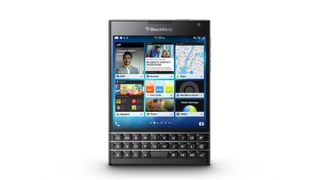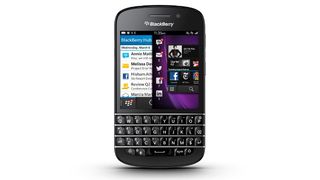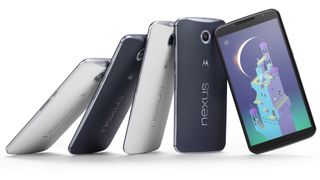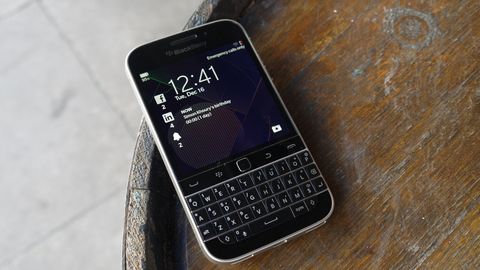Why you can trust TechRadar
BlackBerry Passport

The other flagship phone in BlackBerry's line-up in 2015, the Passport, ditches the tool belt and modifies the keyboard, as well as offering a bigger screen and better specs. That extra power and room on the display can really come in useful, even though you may have to use two hands rather than one in order to take advantage of it.
You're looking at a 4.5-inch, 1440 x 1440 pixel screen and a quad-core 2.26GHz processor, and on top of that there's more storage space and a better camera. Of course all this comes at a cost and the Passport will set you back £529 ($599, AUS$680) for a SIM-free version.
As for the Classic, it's running the same software as the Passport – and all the pros and cons that come with it – but on a smaller screen with less powerful innards. You're only really going to choose the newer phone if you want to save yourself some money, you appreciate the smaller size or you absolutely want to have a trackpad and a traditional BlackBerry keyboard at your disposal.
The Passport does have a QWERTY keyboard but it's on three rows rather than four and doesn't have quite the versatility of the one sported by the Classic.
BlackBerry Q10

The Classic is the direct successor to the Q10 (it was originally called the Q20) and the upgrade is something of a no-brainer for BlackBerry fans, assuming they have some spare cash in their pockets.
You're getting a slightly bigger screen, the additional of the tool belt and the usefulness of the trackpad, and access to the latest and greatest version of BlackBerry 10. Not much has changed in terms of the internal specifications but those differences should be enough to tempt most people into upgrading, and the Classic will be able to take on more software updates in the future.
Unless you can get a very good deal on the Q10 and you think the belt of shortcut buttons is a bit of an eyesore, we'd recommend plumping for the Classic if you're in the market for an inexpensive BlackBerry phone.
The screen resolution is the same on both devices (so text is a little sharper on the Q10's smaller screen), and it's a little more compact too, but there isn't a great deal in its favour. There might not be a whole lot to choose between these two handsets in terms of the camera and software capabilities but the majority of BlackBerry fans are going to plump for the Classic.
Nexus 6

Google's latest flagship phone offers the best that Android can offer, assuming you can get your hands on it, so it's worth comparing it against the best that BlackBerry can offer.
The differences are fairly obvious: the 5.96-inch 2560 x 1440 pixel QHD AMOLED display and quad-core 2.7GHz run rings around what BlackBerry is offering, while Android 5.0 Lollipop offers an experience that's slick, intuitive and full of the latest and greatest apps. It's a demonstration of just how well Android has matured and it's a worthy competitor to the latest iPhones released by Apple, although we'd like to see it at a cheaper price.
In the Classic's favour, it offers more in the way of security and enterprise capabilities (well, depending on your company) and it can be used in one hand easily, which is definitely a bonus.
It has a trackpad and a QWERTY keyboard as well as a touchscreen which may or may not prove to be a serious improvement over the Nexus 6 depending on the dexterity of your fingers, your history with BlackBerry and your personal preferences. There will be those who prefer the Classic, but I'm not sure there'll be a lot of them, even with the price difference.

Dave is a freelance tech journalist who has been writing about gadgets, apps and the web for more than two decades. Based out of Stockport, England, on TechRadar you'll find him covering news, features and reviews, particularly for phones, tablets and wearables. Working to ensure our breaking news coverage is the best in the business over weekends, David also has bylines at Gizmodo, T3, PopSci and a few other places besides, as well as being many years editing the likes of PC Explorer and The Hardware Handbook.

